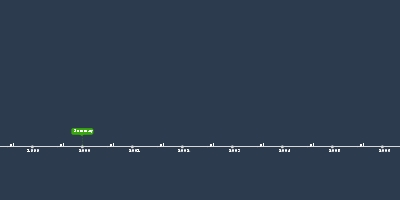1 gen 1960 anni - The Conscience of a COnservative
Descrizione:
Goldwater was born in what would become the state of Arizona and inherited the Sunbelt’s libertarian spirit of limited government and great personal freedom. His 1960 book, The Conscience of a Conservative, set forth an uncompromising conservatism. In direct and accessible prose, Goldwater attacked the New Deal state, arguing that “the natural tendency of government [is] to expand in the direction of absolutism.” The problem with the Republican Party, as he saw it, was that Dwight Eisenhower had been too accommodating to liberalism. When Ike told reporters that he was “liberal when it comes to human problems,” Goldwater had privately fumed.The Conscience of a Conservative spurred a Republican grassroots movement in support of Goldwater. By distributing the book widely and mobilizing activists at state party conventions, conservatives hoped to generate enough support that Goldwater could be “drafted” to run for president in 1964, an assignment he did not relish. Meanwhile, Goldwater published another book, Why Not Victory?, in which he criticized the containment policy — the strategy of preventing the spread of communism embraced by both Democrats and Republicans since 1947 (see “The Containment Strategy” in Chapter 24). That policy, he would later complain in a 1964 speech, amounted to “timidly refusing to draw our own lines against aggression … unmarked by pride or the prospect of victory.” Goldwater wanted to roll back and diminish Soviet power, not simply “contain” it. With his unapologetic views, he had enchanted a small but energetic group of conservative activists.
Because moderates dominated the Republican Party leadership, the “Draft Goldwater” movement had to work from the bottom up. They found thousands upon thousands of Americans willing to hit the streets on behalf of their political hero. Organizations such as the John Birch Society, Young Americans for Freedom, and the Liberty Lobby supplied an army of eager volunteers. They came from such conservative strongholds as Orange County, California, and the fast-growing suburbs of Phoenix, Dallas, Houston, Atlanta, and other Sunbelt metropolises. A critical boost came in the early spring of 1964, when conservatives outmaneuvered moderates at the state convention of the California Republican Party, which then enthusiastically endorsed Goldwater. The fight was bruising, and one moderate Republican warned that “sinister forces are at work to take over the whole Republican apparatus in California.”
The appearance of a book by Phyllis Schlafly, then a relatively unknown conservative activist from the Midwest, spurred on the Goldwater movement. Like The Conscience of a Conservative, Schlafly’s A Choice Not an Echo accused moderate Republicans of being Democrats in all but name (that is, an “echo” of Democrats). Schlafly, who would return to the national spotlight in the early 1970s to fight the ratification of the Equal Rights Amendment (see “The Women’s Movement and Gay Rights” in Chapter 28), denounced the “Rockefeller Republicans” of the Northeast and encouraged the party to embrace a defiant conservatism. Contrasting Goldwater’s “grassroots Republicans” with Rockefeller’s “kingmakers,” Schlafly hoped to “forestall another defeat like 1940, 1944, 1948, and 1960” — all Democratic victories.
At the 1964 Republican National Convention, the conservative groundswell won the nomination for Goldwater — and shocked both moderate Republicans and reporters in the convention hall. However, Goldwater’s strident tone and militarist foreign policy were too much for a nation still committed to liberalism. Aided by the legacy of John F. Kennedy, Lyndon B. Johnson defeated Goldwater in a historic landslide. Many believed that Goldwater conservatism would wither away after its brief moment. Instead the nearly four million volunteers who had campaigned for the Arizona senator built toward the future. Skilled conservative political operatives such as Richard Viguerie, a Texas-born Catholic and antiabortion activist, applied new technology to political campaigning. Viguerie took a list of 12,000 Goldwater contributors and used computerized mailing lists, which were new at the time, to solicit campaign funds, rally support for conservative causes, and get out the vote on election day. The major beneficiary of this new form of political organizing was Ronald Reagan.
Financed by wealthy southern Californians and supported by Goldwaterites, Reagan won California’s governorship in 1966 and again in 1970. He succeeded with a promise of limited government and law and order — referring to campus radicals, he vowed to “clean up the mess in Berkeley” — a pledge that found broad support in the nation’s most populous state. His rhetoric also made him a force in national politics, and supporters believed that he was in line to succeed Nixon as the next Republican president. Due to the Watergate scandal, however, Gerald Ford was the incumbent president, which gave him just enough of an edge to narrowly defeat Reagan for the Republican nomination in 1976. When Ford lost to Jimmy Carter in that year’s election, the party’s brightest star only had to wait — Reagan was a near lock for the Republican nomination in 1980.
Aggiunto al nastro di tempo:
Data:
1 gen 1960 anni
Adesso
~ 65 years ago
